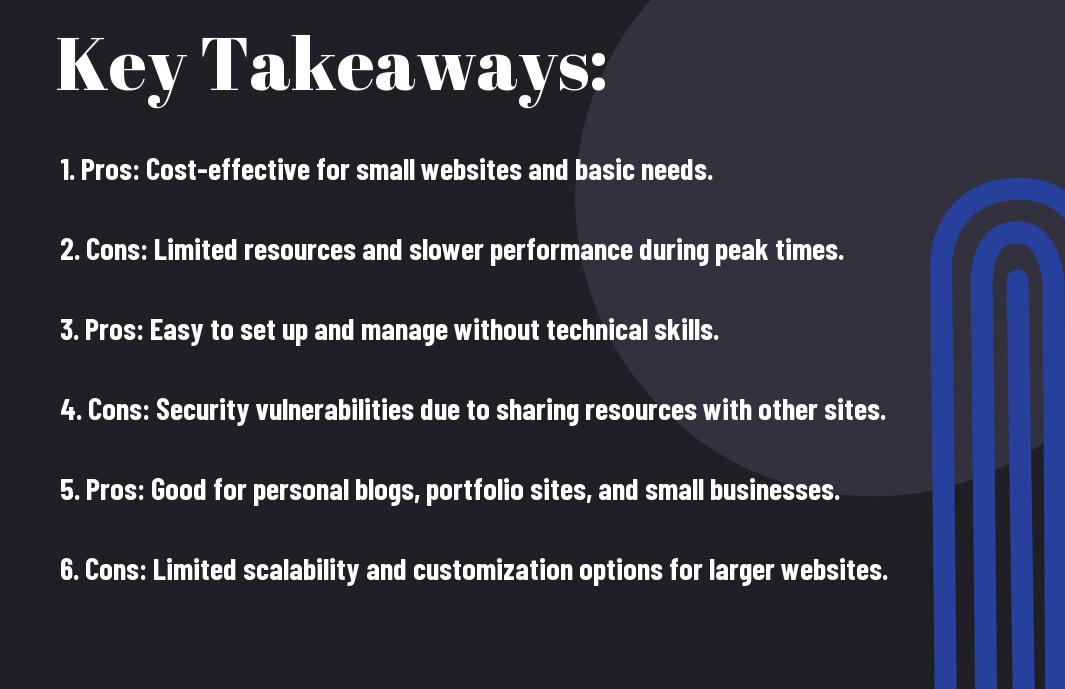When it comes to launching your website, one of the most crucial decisions you’ll face is choosing the right web hosting plan. Shared hosting is a popular choice for many starting out because of its affordability and convenience, but it also comes with its own set of risks and limitations that you need to consider. In this post, we’ll take a closer look at the advantages and disadvantages of shared web hosting, so you can make an informed decision that suits your specific needs. Whether you’re a small business owner, a blogger, or a freelancer looking to establish your online presence, understanding the pros and cons of shared hosting can help you avoid potential pitfalls and achieve success with your website.
Key Takeaways:
- Cost-effective option: Shared web hosting allows for cost savings as the resources and server hardware are shared among multiple users, resulting in lower fees for each individual.
- Performance limitations: With shared hosting, the performance of your website can be affected by the activity and demands of other websites sharing the same server, which may lead to slower loading times and potential downtime.
- Limited control and security: Shared hosting means sharing server resources and security measures with other users, which could pose potential risks in terms of security and customization options for your website.


Understanding Shared Web Hosting
Your website needs a place to live on the internet, and shared web hosting is a popular option for many small businesses and individuals. In this chapter, we will explore the ins and outs of shared web hosting, including its definition and key features.
Definition of Shared Web Hosting
Shared web hosting is a type of web hosting where multiple websites are hosted on the same server. This means that the resources of the server, such as disk space, bandwidth, and processing power, are shared among all the websites hosted on that server. It is a cost-effective option for individuals and small businesses who do not require the resources of an entire server for their website.
Key Features of Shared Web Hosting
Shared web hosting offers several key features that make it a popular choice for many website owners. Some of the main features include:
- Affordability: Shared web hosting is one of the most affordable options for hosting your website, making it ideal for individuals and small businesses with limited budgets.
- Ease of Use: Many shared hosting providers offer user-friendly control panels, making it easy for you to manage your website and server settings.
- Scalability: Most shared hosting plans offer the ability to easily upgrade your resources as your website grows, allowing you to scale your hosting as needed.
Perceiving these key features can help you determine if shared web hosting is the right choice for your website.
The Pros of Shared Web Hosting
Any website owner knows the importance of reliable and efficient web hosting. Shared web hosting offers a range of benefits that make it a popular choice for many businesses and individuals. If you’re considering shared web hosting, here are some advantages to keep in mind. For a more comprehensive look at shared hosting, you can check out Shared Web Hosting Benefits: Is It Right for You? Complete …
Cost-Effectiveness
One of the primary advantages of shared web hosting is its cost-effectiveness. With shared hosting, you split the cost of server maintenance and resources with other users, making it a more affordable option for those on a budget. This can be especially beneficial for small businesses or personal websites that do not require a large amount of server resources.
Ease of Use and Management
Shared web hosting is designed to be user-friendly and easy to manage, even for those with little technical expertise. Most shared hosting providers offer intuitive control panels and pre-installed software, allowing you to easily manage your website, email accounts, and other features without needing in-depth technical knowledge.
Pre-configured Server Environment
When you opt for shared web hosting, you benefit from a pre-configured server environment that is set up and maintained by the hosting provider. This means you don’t have to worry about managing server configurations, security updates, or software installations, as these are taken care of by the hosting company.
Built-in Maintenance and Support
Shared hosting plans typically include built-in maintenance and support services, ensuring that your website remains operational and secure. Your hosting provider will handle server upgrades, security patches, and technical support, allowing you to focus on managing your website and growing your online presence.
The Cons of Shared Web Hosting
After learning about the benefits of shared web hosting, it’s time to focus on the potential drawbacks. While shared hosting can offer cost-effective solutions for website owners, it’s important to consider the downsides as well. Here are some of the common cons associated with shared web hosting. If you want to learn more about what is shared hosting and how it works, along with its pros and cons, you can check out this detailed guide.
Limited Resources and Performance
When you opt for shared web hosting, you are sharing server resources with multiple other websites. This means that if another site on the same server experiences a surge in traffic or consumes a large amount of resources, it could potentially impact the performance of your own website. This can lead to slower loading times and reduced overall performance, which could be detrimental to your site’s user experience and search engine rankings.
Security Concerns
Another downside of shared web hosting is the potential for security vulnerabilities. Since multiple websites are hosted on the same server, if one site is compromised, it could put the entire server at risk. This can leave your website vulnerable to malware infections, hacking attempts, and data breaches. While reputable hosting providers implement security measures, the shared nature of the hosting environment introduces an inherent level of risk.
Reduced Flexibility and Control
With shared web hosting, you have limited control over the server environment. Since you are sharing resources with other websites, you may not have the flexibility to customize server configurations or install specific software that your website may require. This can be restrictive, especially for websites that have unique or complex hosting needs.
Potential for Overcrowding
Shared hosting providers often oversell server resources to maximize profits. This can lead to overcrowding of the server, as more websites are added to the server than it can efficiently handle. As a result, you may experience unreliable performance and frequent downtime due to resource constraints.
Who Should Consider Shared Web Hosting
For those who are just starting out with their website and have a limited budget, shared web hosting can be a great option. This type of hosting is also suitable for small businesses, personal websites, and blogs that don’t expect a high volume of traffic. If you want to weigh the pros and cons of shared hosting, you can check out this article on Pros and Cons of Shared Hosting to help you make an informed decision.
Suitable Scenarios for Shared Hosting
If you are a small business or an individual looking to host a personal website or blog, shared hosting is a suitable choice for you. It is also ideal if you are on a tight budget and want to minimize your hosting costs. With shared web hosting, you have access to a variety of features and tools to help you get your site up and running quickly and easily. It’s a cost-effective solution for beginners who want to establish an online presence without investing too much right from the start.
When to Upgrade to a Different Hosting Solution
While shared web hosting can be a great starting point, there may come a time when your website outgrows the resources and limitations that come with shared hosting. If you find that your website experiences frequent slowdowns or downtime, or if you require more control over your server environment, it may be time to consider upgrading to a different hosting solution. Additionally, if your website begins to attract a large volume of traffic, you may want to explore options that offer more scalability and flexibility to accommodate your growing needs. Remember that as your website grows, it’s important to reassess your hosting requirements to ensure optimal performance and user experience.
The Pros and Cons of Shared Web Hosting
With these considerations in mind, shared web hosting can be a cost-effective and convenient option for individuals or small businesses looking to establish an online presence. However, it is important to weigh the potential drawbacks such as limited resources, security concerns, and potential performance issues. Ultimately, your decision should be based on your specific needs and priorities. If budget and ease of use are your main concerns, shared hosting may be the right choice for you. However, if performance, security, and scalability are top priorities, you may want to consider alternative hosting options such as VPS or dedicated hosting. By carefully evaluating the pros and cons, you can make an informed decision that aligns with your long-term goals and requirements for your website.
FAQ
Q: What is shared web hosting?
A: Shared web hosting is a type of web hosting where multiple websites are hosted on a single server. This means that the resources of the server, such as CPU, memory, and bandwidth, are shared among all the websites hosted on that server.
Q: What are the pros of shared web hosting?
A: One of the main advantages of shared web hosting is its affordability. Since the server resources are shared among multiple websites, the cost of hosting is significantly lower. Additionally, shared web hosting is easy to set up and manage, making it ideal for beginners or small businesses.
Q: What are the cons of shared web hosting?
A: One of the drawbacks of shared web hosting is the potential for slower website performance. Since resources are shared, high traffic or resource-intensive websites on the same server can affect the performance of other websites. Additionally, there are limitations on customization and control, as the server settings are managed by the hosting provider.
Q: Is shared web hosting suitable for my business?
A: Shared web hosting is best suited for small businesses, personal websites, and blogs with low to moderate traffic. If your website requires high performance, advanced security features, or custom server configurations, you may want to consider other hosting options such as VPS or dedicated hosting.
Q: How can I improve the performance of my website on a shared hosting server?
A: To optimize the performance of your website on a shared hosting server, you can consider using caching mechanisms, optimizing your website’s code and images, and minimizing the use of server resources. Additionally, choosing a reliable and reputable hosting provider with good server maintenance and strong security measures can also improve the overall performance of your website.
CATEGORY:Web Hosting

